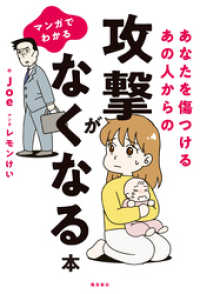- ホーム
- > 洋書
- > 英文書
- > Politics / International Relations
Full Description
In Vibrant Matter the political theorist Jane Bennett, renowned for her work on nature, ethics, and affect, shifts her focus from the human experience of things to things themselves. Bennett argues that political theory needs to do a better job of recognizing the active participation of nonhuman forces in events. Toward that end, she theorizes a "vital materiality" that runs through and across bodies, both human and nonhuman. Bennett explores how political analyses of public events might change were we to acknowledge that agency always emerges as the effect of ad hoc configurations of human and nonhuman forces. She suggests that recognizing that agency is distributed this way, and is not solely the province of humans, might spur the cultivation of a more responsible, ecologically sound politics: a politics less devoted to blaming and condemning individuals than to discerning the web of forces affecting situations and events.Bennett examines the political and theoretical implications of vital materialism through extended discussions of commonplace things and physical phenomena including stem cells, fish oils, electricity, metal, and trash. She reflects on the vital power of material formations such as landfills, which generate lively streams of chemicals, and omega-3 fatty acids, which can transform brain chemistry and mood. Along the way, she engages with the concepts and claims of Spinoza, Nietzsche, Thoreau, Darwin, Adorno, and Deleuze, disclosing a long history of thinking about vibrant matter in Western philosophy, including attempts by Kant, Bergson, and the embryologist Hans Driesch to name the "vital force" inherent in material forms. Bennett concludes by sketching the contours of a "green materialist" ecophilosophy.
Contents
Preface vii
Acknowledgments xxi
1. The Force of Things 1
2. The Agency of Assemblages 20
3. Edible Matter 39
4. A Life of Metal 52
5. Neither Vitalism nor Mechanism 62
6. Stem Cells and the Culture of Life 82
7. Political Ecologies 94
8. Vitality and Self-interest 110
Notes 123
Bibliography 157
Index 171
-

- 電子書籍
- Sab(サブ)な彼女の裏事情【全年齢版…
-

- 電子書籍
- マンガでわかる あなたを傷つけるあの人…
-

- 電子書籍
- 日本海軍艦艇写真集 巡洋艦 - 呉市海…
-

- 電子書籍
- 召喚教師リアルバウトハイスクール8 富…




